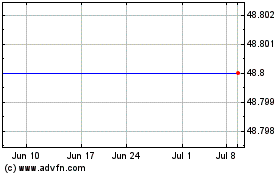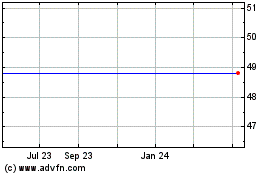Exelon Executive Says Energy Challenges Call for Innovative Policies and Sustained Investment in Next Generation Grid
May 05 2016 - 6:11PM
Business Wire
Exelon is creating the next-generation power grid through
sustained investment in technology combined with a focus on
innovative policies that hasten the transition to a clean energy
future, said William A. Von Hoene Jr., senior executive vice
president and chief strategy officer for Exelon. Von Hoene spoke to
corporate and government energy leaders and policymakers at the
U.S. Energy Association’s Annual Membership Meeting & Public
Policy Forum held at the National Press Club.
“Customers want tools that give them more control over their
energy use and they want leading-edge technology that increases
reliability and efficiency, while keeping their utility bills
affordable,” Von Hoene said. “They also want to help advance a
cleaner, more sustainable energy future, and that requires new
policy solutions at every level.”
The way Exelon and other energy providers produce, manage and
deliver power is changing at a dramatic pace as a result of new
technology and customer demand for energy that is always on and,
increasingly, clean. Exelon will invest $25 billion in its six
utilities over the next five years as part of a broader effort to
modernize the power grid with investments in infrastructure and
smart grid technology, among other things. Von Hoene said the
energy industry is only just starting to realize the broad
potential of smart grid and its benefit to customers. For example,
Exelon’s Baltimore-based BGE utility completed smart meter
installations in 2015 and projects it will result in $1.5 billion
in customer savings.
Modernizing the grid also allows energy providers to reimagine
how they produce and deliver power. One way Exelon is doing that is
through microgrids, which are self-contained, small-scale electric
grids with their own power source. Exelon’s ComEd utility, for
example, is working with the community of Bronzeville in Chicago to
deploy solar and battery technology within a microgrid project that
will be one of the most sophisticated of its kind in the
Midwest.
Von Hoene said that solar, wind, fuel cells and other localized,
clean generation will have an important role to play going forward.
At the same time, maintaining the existing nuclear fleet remains
among the most important policy challenges in the effort to advance
zero-carbon energy. Nuclear energy provides about 63 percent of the
nation’s zero-carbon energy, but some plants are at risk of early
retirement due to wholesale energy prices that are at a 15-year
low.
“Losing these nuclear plants would not only jeopardize
reliability of the grid, but it would make it nearly impossible to
meet our nation’s goals to reduce carbon emissions,” Von Hoene
said. “Unfortunately, current energy policies do not fairly
compensate nuclear energy for its reliability and zero-carbon
benefits.”
In the absence of a national carbon policy, many states are
acting on their own in response to consumer demand for clean
energy. For example, in Illinois, Exelon has joined with other
stakeholders to develop legislation that includes a zero emission
standard that will benefit the state’s at-risk nuclear plants. The
legislation is also expected to jumpstart development of solar
energy in Illinois and increase energy efficiency programs. A
similar proposal has been introduced in New York with the goal of
preserving upstate nuclear energy facilities that contribute more
than $3 billion to the state’s economy.
“Through innovative policy design, we can meet demand for more
clean energy, achieve emission-reduction goals and benefit the
economy without sacrificing reliability or affordability,” Von
Hoene said.
About Exelon Corporation
Exelon Corporation (NYSE: EXC), now including the Pepco Holdings
utilities, is the nation’s leading competitive energy provider,
with 2015 revenues of approximately $34.5 billion. Headquartered in
Chicago, Exelon does business in 48 states, the District of
Columbia and Canada. Exelon is one of the largest competitive U.S.
power generators, with more than 32,700 megawatts of owned capacity
comprising one of the nation’s cleanest and lowest-cost power
generation fleets. The company’s Constellation business unit
provides energy products and services to approximately 2 million
residential, public sector and business customers, including more
than two-thirds of the Fortune 100. Exelon’s six utilities deliver
electricity and natural gas to approximately 10 million customers
in Delaware, the District of Columbia, Illinois, Maryland, New
Jersey and Pennsylvania through its Atlantic City Electric, BGE,
ComEd, Delmarva Power, PECO and Pepco subsidiaries. Follow Exelon
on Twitter @Exelon.
View source
version on businesswire.com: http://www.businesswire.com/news/home/20160505006781/en/
Exelon CorporationPaul
Adams410-470-4167paul.adams@constellation.com
Exelon (NYSE:EXC)
Historical Stock Chart
From Mar 2024 to Apr 2024

Exelon (NYSE:EXC)
Historical Stock Chart
From Apr 2023 to Apr 2024
